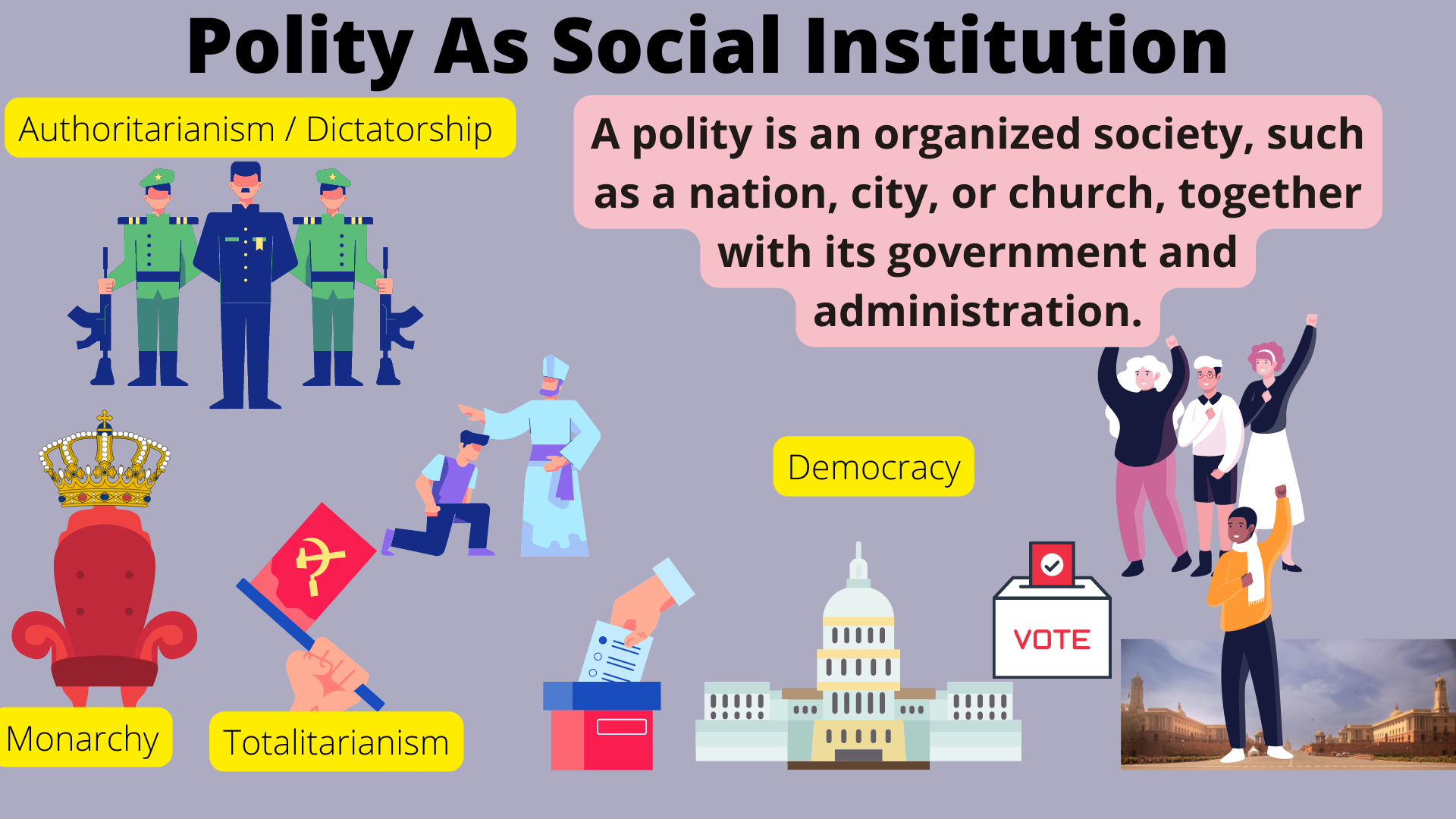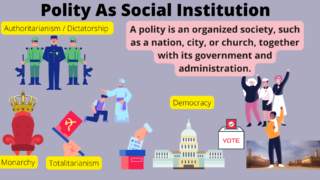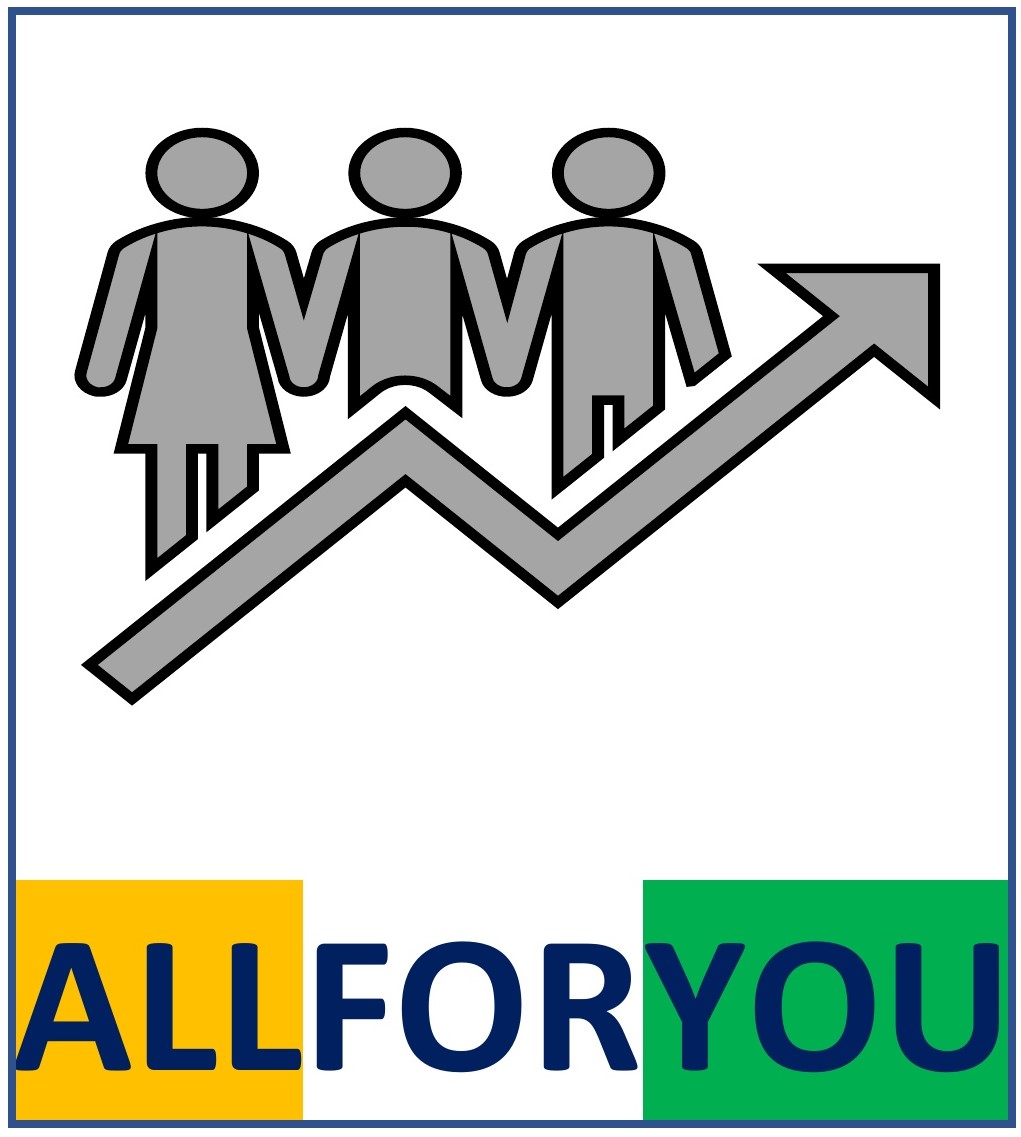
Polity as Social Institution | State
A polity, is a fundamental social institution that is essential for human life and society. It functions to maintain peace and order in society through law and is the form or organization of government that manages public or civil affairs and the life of the people.
Membership in the state institution is mandatory for people living within its territory, and the government is approved by the people. Legitimate power is behind the laws made by the state institution, and it has the final and supreme authority, making it sovereign.
The Polity institution’s primary function is to maintain peace and order in society, and it provides security from external enemies. It governs the people living within a specific territory, and the government must follow the laws made by the state institution.

Characteristics of a state or Polity
- A state organization governs the people living in a particular territory.
- Membership of the state organization is mandatory for people living in that territory.
- The government has the approval of the people.
- The people are required to follow the laws made by the state organization.
- Legitimate power stands behind these laws.
- The state body has the final and supreme authority; it is sovereign.
- The state institution mainly works to maintain peace and order in society.
- The government has to provide security from external enemies.
- The governance system works as a system that performs all the above functions through the state organization.
Forms Of Polity | Types Of Polity | Types of State
Monarchy
A monarchy is a form of government in which the king or queen has complete power over the country. One person holds the power of the country, and this type of government existed in ancient times. A representative of a family that holds power controls the government, and power is passed from generation to generation within that family.
There are two types of monarchy:
Absolute monarchy:
This type of monarchy consists of a king, queen, emperor, or empress who gets power by inheritance from members of the royal family. The king has absolute power, which means he can make all the decisions without consulting anyone. Supreme power rests in the hands of the ruler. Examples include Brunei, Oman, Saudi Arabia, and Vatican City.
Constitutional monarchy
Most countries in the world have constitutional monarchies, in which the reigning member of the royal family is the symbolic head of state, but elected officials actually rule. Constitutional monarchies exist today in many European countries, including Great Britain, the United Kingdom, New Zealand, Canada, Jamaica, and the Commonwealth of Nations.
Dictatorship:
Dictatorship is a form of government in which one person has absolute power over a country or state. In a dictatorship, one person holds the power of the country, and everyone has to listen to what he or she says. It is a form of government or political system in which citizens are not allowed to participate in the decision-making process of the government.
Characteristics of dictatorship include:
- A form of government in which absolute power is concentrated in a dictator.
- The government is under the control of one person.
- Power is acquired by military force rather than by inheritance.
- Often members were members of the military or forces.
- There is no limit to their power. Decisions are made arbitrarily. People’s demand or decision is kept secondary.
- Foreign invasion and patriotism are born.
Examples of dictatorship include Adolf Hitler in Nazi Germany and Saddam Hussain in Iraq.
Democracy
Democracy is a form of government in which the supreme power is in the hands of the people, and the government works directly or indirectly through the system of representation. Power is delegated by all the people to the representatives of the people, and “government by the people” is made. Abraham Lincoln defined democracy as a government run by the people, for the people, and of the people.
There are two types of democracy:
Direct democracy
Direct democracy, also called “Pure democracy,” is a system in which people vote on all issues. This type of democracy is very rare.
Representative democracy
Representative democracy is a system in which elected representatives elect the president and give him or her the power to vote on issues.
There are two types of representative democracy
Parliamentary democracy
In parliamentary democracy, electors elect members to parliament (legislature). This political system is based on the idea that Parliament is supreme, and people elect representatives in regular elections, such as in India
Presidential democracy
In presidential democracy, elected representatives elect the president and give him or her the power to vote on issues, such as in the United States.
Autocracy/Totalitarianism
A political system where the government maintains strict control over almost all aspects of citizens’ lives. Individual freedom and freedom of expression are not given to people. Autocracy is usually run by a leader with divine power, while in totalitarianism, the country is run by a single political party.
In Marathi please click on next link:- राज्यसंस्था | Polity As Social Institution,
